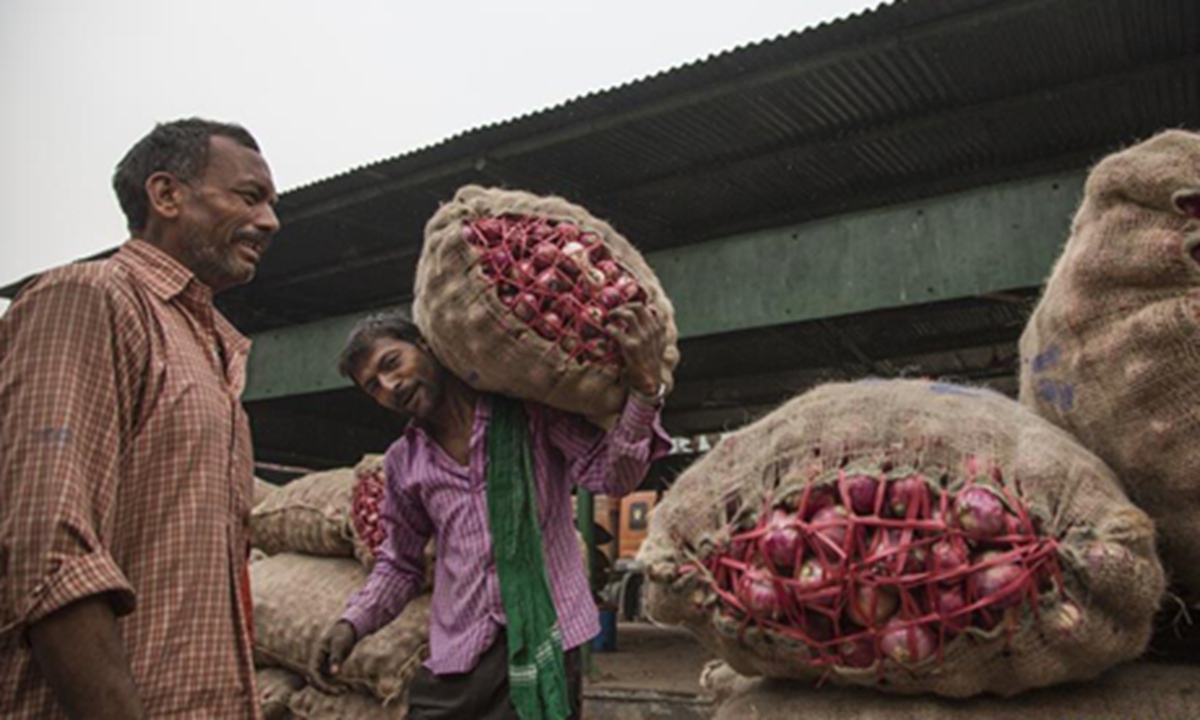
A labor carries a sack of onions at a wholesale market in New Delhi, India. Photo: Xinhua
Just days after an abrupt decision to ban exports of onions, the Indian government is working on an arrangement to relax restrictions and release onion consignments to some of its neighboring countries, according to Indian media over the weekend.
The humble onion is nevertheless a crucial ingredient in South Asian cuisine, and India's quick change of policy regarding its export raises concerns over the country's food security amid the coronavirus pandemic. Cheap and easily produced onions have long been a staple vegetable for India's poor, and if Indians can't afford onions, it's an indication that big difficulties may lie ahead.
According to media reports, flooding in major onion-producing states is the cause of India's supply crunch and price spike. But even if India's onions are in short supply, it doesn't seem to justify its abrupt export ban, which caught countries that heavily depend on Indian onions by surprise.
As onion prices in countries like Bangladesh soared following the ban, India risked its reputation as a reliable trading partner. However, this is not the first time India has abruptly banned onion exports. In September 2019, the Indian government imposed a similar export ban on onions, according to media reports.
In many cases the market can naturally adjust pricing due to supply and demand, but higher prices in the domestic market will discourage exports.
However, the question is whether the onion shortage is an isolated case, or forebodes a future food supply problem. At present, we don't know much about the production of other agricultural products in India, and it is uncertain whether the harvesting of other crops will or has already taken a hit from flooding and coronavirus pandemic. Only the Indian government has the answer.
Nevertheless, the market always offers the best clues to the reality of a situation. If prices go up, it indicates a supply shortage. If the shortage of a certain produce, whether onions or other crops, affects the livelihood of its people, it is essential for India to guarantee its own food security before considering its export market share. Under the current circumstances, preventing a domestic food crisis should be the Indian government's priority as it battles the epidemic.
Perhaps the onion export ban serves as a reflection of the chaotic state of India's policymaking, with the coronavirus pandemic out of control and its economy in the doldrums. The policy confusion may also have something to do with rising nationalist sentiment in the country.
The Indian government tends to inflate unnecessary issues. For instance, India loosened the onion export ban because it wanted to stop Pakistan, Turkey and China - whom India currently doesn't enjoy a good relationship with - from filling the market void, The Tribune reported on Saturday.
It is understandable that Indian policymakers want to achieve multiple goals, but sometimes it needs to be more practical in order to prioritize the fundamental needs of its people.
